|
Diseases of Poultry
By Ivan Dinev, DVM, PhD
|
INFECTIOUS ENCEPHALOMYELITIS
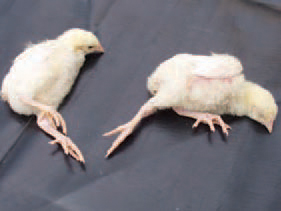
248.The infectious encephalomyelitis (IEM) is characterized by signs of ataxia, progressing to paralysis, prostration and marked tremor of the head and the neck, and because of that, is also called epidemic tremor. The chickens with prostration are usually in lateral recumbency.
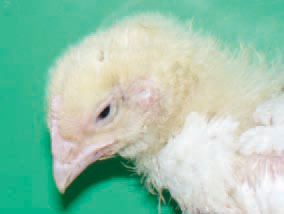
249.The tremor could be unapparent, but is often perceptible when the chicken is held gently with the hand and carefully looked at. the expression of the eye is dull. IEM outbreaks are generally observed in chickens at the age between 8 - 9 and 20 days. the morbidity rate could reach 40 - 60%. the average death rate is about 25%, but could be more than 50%. Gross lesions are not present.
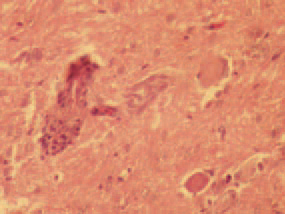
250.The histological lesions are specific and with a diagnostic value. A nonpurulent encephalomyelitis with marked perivascular clusters is present. The IEM virus is from the Picornaviridae family. The previous studies placed the virus in the Enterovirus genus, but based on the most recent studies, it is provisionally referred to the Hepatovirus genus. The virus is found in faeces of infected chickens and could survive there for at least 4 weeks. It is relatively highly resistant to environmental conditions.
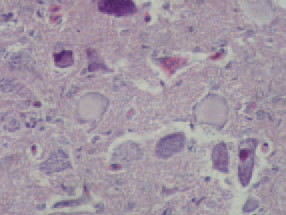
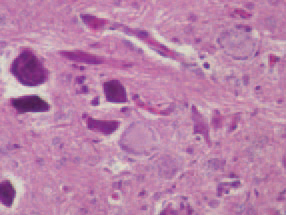
251.252.. A particularly valuable finding is the central chromatolysis (251) of neurons in segments from the lumbosacral widening of the spinal cord and more rarely, chromatopyknosis (252). The infection occurs in non-vaccinated broiler breeder flocks and its course is subclinical. A vertical transmission of the infection to susceptible birds is realized by the eggs laid during this period. At the same time, parents acquire immunity and transmit it to the next generations thus protecting them from IEM. So, clinical manifestation of IEM is observed in chickens, hatched from the eggs during the 2- or 3 week period after breeder flock's infection. The next generations are immune.

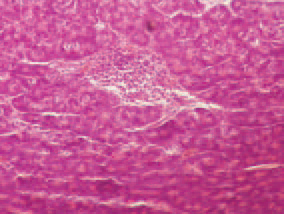
253.254.Valuable diagnostic findings are the dense lymphoid clusters in the muscles of the proventriculus and the gizzard (253) and in the pancreatic interstitium (254). The history of the disease, the age of onset and the typical nervous signs, especially the head tremor are indicative for the diagnosis that could be finally confirmed by histology. IEM should be differentiated from other diseases with nervous symptoms as encephalomalacia, mycotic encephalites, toxicoses (salt, pesticides). Prevention -vaccination of breeder flocks with regard to ensuring maxi-mum protection of their offspring. The chickens from naturally infected flocks obtain an adequate maternal immunity that preserves them from the disease.






